In a normal world, every generation inherits something from its fathers and forefathers. The inheritance may consist of traditions, cultural identities, abilities associated to a particular work, and actually so many things it would be near impossible to make an exhaustive list of what we take from the past. As the elder brother amongst his siblings, my uncle received a gold signet ring with his initials written on it when he finished high school with honours.
Today, it seems hard to spot any potential inheritance from our parents’ generation. Many baby boomers rent their flat, work in a cubicle—which means they usually have no trade to teach and no example of fatherhood to give—own 60s rock n’ roll vinyl records or other cultural products that have neither moral nor financial value. Behind their flower power and party culture looms a striking lack.
Americans may think they do not really need to inherit anything. After all, the American dream is about making oneself, working one’s ass off and becoming rich. Yet, now, a growing number of red-pilled youths know that the market is already full, too competitive, and even if they managed to get ahead of the competition, they would be punished through taxes and media shaming. The Constitution is less of a true inheritance than a holy scrap, and entrepreneurship, though meritorious, does barely count as inheritance at all.
If we want to live in a healthy world, we have to create it again. Likewise, if we want inheritance for both us and our future children, we will have to make it too—not out of the blue but at least by reclaiming and owning again what is rightfully ours. One way to do it is through collecting pieces of history. In a deregulated world, where everything tends to go away or get merchandized, owning solid remnants of our ancestors’ deeds feels good, and not merely for the financial value of these pieces.
As for myself, I enjoy bibliophilia, i.e. collecting venerable old or rare books, but you are obviously free to adapt the present piece to whatever gentlemanly purpose such as collecting spades, militaria, or homely furniture. Just make sure you do not ruin yourself in uninteresting DVDs, Pokemon cards or other material that will fall apart and turn worthless over the next years.
Rewarding yourself (without complacency)
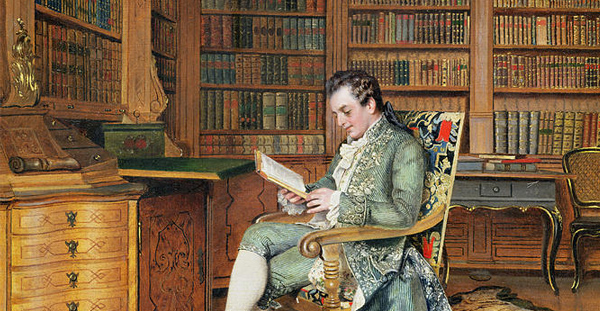
Just add a glass of scotch and that’s it.
By definition, what is well-made, well-conserved and comes from a more or less distant past is estimated, which means it is also more or less rare and expensive. Buying something like that is not as easy as it sounds. Someone may sell rare books in an excellent state, yet you can’t understand the language these books are written in, or their topic is not relevant to your interests. Someone may sell a rare book relevant to your interests and endowed with a beautiful leather cover, yet when you receive it you notice the poor state of the pages. Someone sells a rare book with every part in a fair state, a book you can read and could proudly display in our interior, but the seller is clever, wants to squeak every penny he can from the book, and his product is damn too expensive.
Finding something you can buy or negotiate and that is actually interesting can be a challenge. When you succeed at this and receive the interesting object at home, you can think of it as a fair reward for your curiosity and research, let alone the money spent.
Becoming knowledgeable about whatever you own

To the point when your bookshelf starts attracting random cats.
The objects we are talking about come with a history. I have seen a book from the 1890s, widely sold in paperback, bought by a wealthy man who paid a craftsman to make him a fully leathered cover with gilt letterings and dentells inside. This now unique book was later bought by an academic who eventually died and then back on a now world wide market.
Whatever you set your sights on, if you stick to it long enough, you will by necessity become knowledgeable about it. A genuine bibliophile knows about the ex-libris, half-leather or signature. More importantly, you are able to touch and maneuver the objects, which gives you a direct knowledge of them. You know a book is old enough when the ‘s’ are written as ‘ſ.’ Is that snobbery? Perhaps a bit, but I would better see it as picking up the torch of a high part of culture and making it alive through ourselves.
A direct and independent access to history
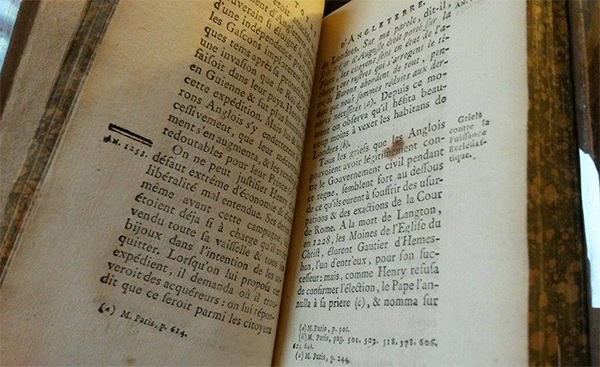
Ah, the sweet pleasure of reading a book written by a Scot yet translated in French because said language was then the European lingua franca.
Usually, if you want to know about the history of something, you need to go through official specialists, take courses or visit museums. While this is all a normal part of life, having some of the thing between your hands changes completely the relation you have to it. Suddenly, this is not a mummified artifact that had something to do with your ancestors and has been bought by the State or some banker to be arrogantly displayed, but something you can relate with at a much higher degree.
Cutting some never-folded pages with a sharp knife, cautiously enough to let the page borders straight. Cracking open an eighteenth-century book directly without having to go through Google books or some library. Reading a book that would hardly be printed in a Western editor today, or perhaps into some political ghetto, and that was printed at a major editor to be openly sold and read… These are some of the pleasures afforded by bibliophily.
They entail relating to a past that may be more or less distant in time, but somehow still close and perhaps not finished at all. In a museum, these things are dead artifacts that make money for a bunch of soldouts. In my hands, they become lively again and are more where they actually belong.
A supplement of soul
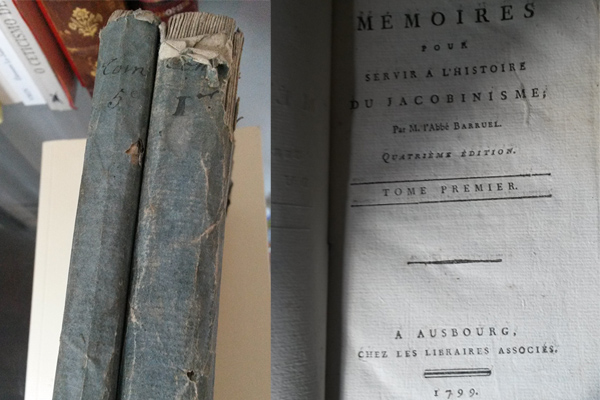
Bum bibliophilia: when your precious eighteenth century books look like an old, worn bunch of paper… to the uninitiated.
Collecting artifacts that are valuable on your eyes is cool. It says something about you. Whatever you choose to collect, this says something about what you care about, enjoy using and learn to be good at. In game, these artifacts may bring you a “supplement of soul” and personality by their sheer historical value and help to relate with girls who might have at least some consideration for said objects. Be careful though, because the line between being passionate about something and being a braggart is sometimes all too easy to cross.
Market knowledge and intuition
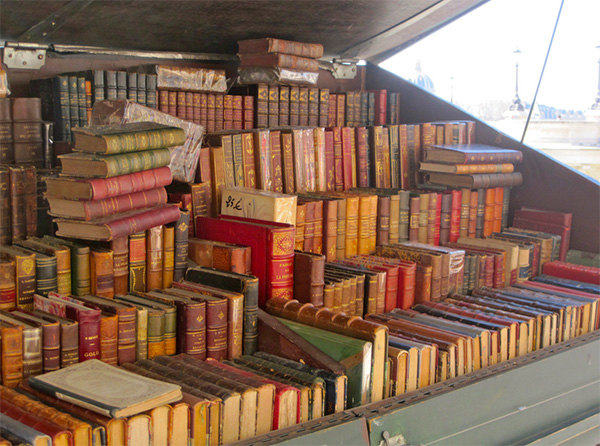
To a bibliophile this looks like a treasure trove. Is it?
Like anything that can be exchanged, bought and sold, valuable objects of any type have their own market. And market prices and stocks change constantly due to a variety of factors. When you check constantly the prices of various interesting objects, and how some get bought off or appear on the market, you grow an intuitive sense of what’s of value or not. And you learn to spot the true opportunities there too. This market sensitivity is analogous to the new sense one acquires through game practice: after getting used to spot the beautiful and/or available girls around, these girls “appear” to one’s look without effort. Experience is about going from a sheer desire or fantasy to a realistic assessment of various situations—and it shows that different domains tend to follow the same dynamics. (Actually, everything has been turning into more and more of a giant market, and this is something we ought to master if we want to take some of these things away from a ruthless, globalized capitalism.)
Sometimes the good stuff is cheap and just requires someone able to sense it before seizing it. Sometimes average stuff is incredibly expensive and overrated, as if all sellers had been tacitly agreeing to maintain high prices. Which, as in any market, can actually happen, especially around very rare books that require a great deal of erudition to be acknowledged.
Recently, a bookseller going bankrupt has been selling his stock at half price. I had sworn to myself not to buy more books for a while but the occasion was too good to miss. Finally, I managed to get 13 books for 100 euros including rare, old, out-of-print and interesting books that would have been 200-300 euros had I bought them to other sellers.
Of course, things are not always that easy: remember the special one with a unique cover? I would have been glad to buy it… except that it was expensive (even considering the pedigree) and disappeared after a few weeks. Definitely, your humble servant was not the only one interested.
Speculation

Definitely, this aspect is neither the most elegant nor appealing of the trade, but being gentlemanly does not prevent one from needing money at times. If you really need to, being able to sell high what you bought cheaply is always good—as long as what you are trading is more important than making money and exploiting the others. I once found an original letter from the great intellectual Lothrop Stoddard, to my knowledge neither reprinted nor copied anywhere, sold 30 euros. Rather cheap, isn’t it? That letter I would not sell for less than 150 euros, a price in line with the prices of many letters from celebrities and “great men,” yet selling it would be but a last resort option. A relic from a genuinely outstanding intellectual has a moral value that can’t be boiled down to a 120 euros margin.
Something to pass on your children
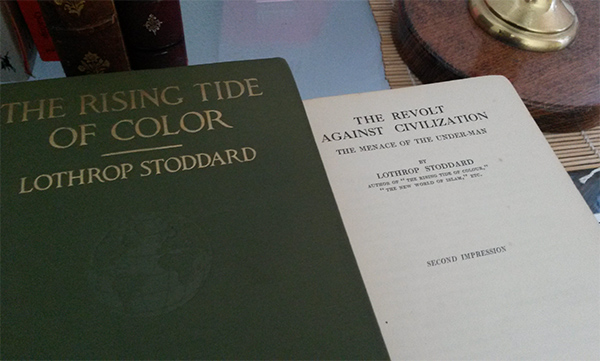
These books (which I highly recommend) can be read for free on the Internet, but having them at hand and on a bookshelf ‘feels’ immensely better.
Neomasculine children will know quite early how resilient and autonomous they will have to be for merely surviving in the world of tomorrow. They will start doing what we do earlier on. This does not mean they have to be overly individualistic, thinking of themselves as mere atoms inside a big market where everyone tries to take money away from others: instead, they should be awoken from the so-called American dream and keep gaining back what is rightfully theirs, without squandering it on the altar of perpetual growth.
The point here is not to make big bucks, though you may acquire a tremendous knowledge of the market, but to gain something you can pass on your children or other culture-sharers instead of abstract customers.
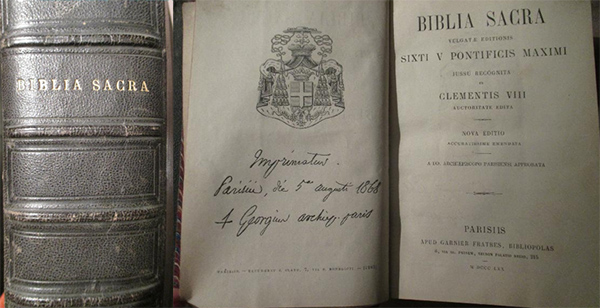
Indeed.
Those of us who have been conservative or have classical “conservative” leanings tend to break from their blue-pilled, leftist families, in spite of their own family values. Inheritance is still there, but it has to be remade or reconquered first. A Catholic friend of mine once sold a whole stock of vinyl records from the Beatles, the Doors and others 60s-70s leftist references from his father in order to buy a Vulgata—the Latin Bible—printed in 1870, and he plans to use it to teach his son about Jesus Christ and the sacred language once used by a once genuine church. And now, this once dead pile of papers jammed between two leathered backs will come to life again and shine before the eyes of a young child.
Read More: American Girls Are The Papa John’s Of Women
Yes. I used to collect old books, encyclopedias and cook books, with the odd bottle every now and again. And leaded crystal, simply because I liked it. The great thing about the encyclopedias is they would show the changing times. Look at one that was written in 1950 as apposed to 1970 and you get to see just how much the culture changed
One of the jewels in my collection is a pair first-edition volumes of “The Collected Essays of Benjamin Franklin”. They are in rough condition yet still readable. Had my brother not saved them, the store would have thrown them out! It pays to have connections!
Very nice, I like going to the flea markets here from time to time, I get lucky every once in a while. Old books and tools get my attention.
There are two places in my area that sell antique books that I frequent, as the antiques are usually cheaper than the contemporary equivalents. Plus they are in fun locations: an old marble works complex and a barely renovated town garage.
Word to the wise don’t try arbitrage if you aren’t some kind of enthusiast. I’ve dabbled successfully (and I do mean dabbled not trying to claim much) but it did work because I was searching around for some out of print book that fit my personal obsessions and noticed real gaps in the market here and there.
For rare items I don’t think there is a real system, because we’re talking about niches of what may be just a few dozen customers in some cases.
OFF TOPIC I think this article about how mainstream media lied about the swimmer Ryan Lochte in Rio deserves an article here in RoK.
http://townhall.com/columnists/derekhunter/2016/08/25/malpractice-the-journalistic-assassination-of-ryan-lochte-n2209533
Lochte admitted he lied. I think the truth was he was drunk and knocked over a sign, so the proprieter (ha) stuck him up to get money for the sign.
In other words, the ‘robbery’ was a reaction to get money for the broken sign. Lochte lied in making it seem like it was random.
Please, read the article first.
Today’s journalists are puppets who recite prepackaged pablum delivered to them by wire services, which cater to the needs of the uber-rich. Not much else to say about that one…
I’ll pay you $97 an hour, but only if you really look like that. You have to be able to suck the chrome off a trailer hitch. Lemme know.
Great article. A more contemporary, but still applicable, “cousin” of sorts to collecting old books is collecting old hardware and software from the 70’s and 80’s. The Commodore computers, for example, and accompanying software represents the beginning of our digital age. The information on those old magnetic disks is worth preserving and part of a newer legacy that grew from keeping information in books.
I still have my commodore 128, Amiga 500 & 1200.
Man those were fun days. Meeting strange older nerdy fat men off the BBS with my buddy so we could obtain pirate software from them. Writing BASIC programs. Playing cool and creative games. I have the Universal Amiga Emulator and occasionally crank up Turrican 2 for its awesome music and unique gameplay.
Oh I remember listening to The Final Battle for hours and hours lol
I get paid roughly 6 thousand-8 thousand bucks monthly for freelancing at home. Everyone eager to finish easy online tasks for some h each day from ease of your home and get valuable salary for doing it… This is a task for you… http://2.gp/G8zm
dfsd
Old tools or musical instruments, too.
From personal experience, passing on your collection of rare coins to your progeny is one way to avoid the taxman.
Coins, books and other collectibles have a tactile presence that either means something to you or doesn’t. For most people it’s going to be about pleasure rather than investment. I inherited some renaissance medals once which had been promised to me since when I was a kid. I had them valued at Sotheby’s only to discover they were worth something but not as much as I’d assumed. Dissatisifed I took them to another expert at Spinks for a second opinion. Said expert took one look at them and announced that they were “neither a coin nor a medal”. Which is how a cunt tells you that you’re trying to pass off forgeries.
The moral is that the pleasure is in the feel and idea of the object, more than the actual value, which is something that much of the time only experts are going to be able to determine.
Rare books are another matter. The problem with old books is that although they look and feel great they are often also very musty and dusty, especially if you’ve got asthma or something.
I’ve got some of these machines for both my flats.
http://www.airfree.pt/Files/Billeder/AirFree/airfree-p3000-main.jpg
They completely solved that problem. Also, if you have your AC system on at least for a few hours a week, you’ll get rid of moist air, which is the main culprit for both molds and “lepisma saccharina”.
There is nothing like having your own library at home. Especially here, in Europe, where books are more diverse and old than in the New World.
that’s an AC / dehumidifier? That might help, but in Dan Brown’s Angels & Demons The Vatican Library preserves it’s precious incunabula by sucking the oxygen out of the room when not in use.
Agree that Europe is great for old books
It’s an air sterilizer (from Airfree, a german/portuguese company). It burns active dust, quietly, which means that spores and allergens are removed without all the mess of filters and fans (and less energy consumption).
Removing O2 is better for really old books, as it stops acidic paint from destroying fibers. Unfortunately, it’s too expensive and completely inadequate for home libraries, as it requires huge machinery. But it’s true, they Really have that process in the Archivio Vaticano. I visited it for a research on Vesalius’ works and could see it with my own eyes. The movie is right (at least that wasn’t a conspiracy theory lol).
You gained access to the Vatican archives! Respect. I imagine you would have need to prove your research needs and request access months in advance
I’d never heard of an air sterilizer. But as an asthma sufferer I might look into it, as I would love to be able to collect old books
Yes, it was a work of persistence and a big investment I did back then.
I was working in Basel, but some works were clearly missing. I needed them for my thesis, so I started asking literally everybody I knew where should these missing drawings and notes be. When I was already desperate, a latinist friend (the papal nuncio) of my Anatomy professor suggested that I could ask the ASV for the Vesalius Index. He made me a recommendation letter, I explained the subject to their expert and they allowed the access (with photographical records only on demand, and made by their photographer), but with a lot of restrictions and ultrasupervised. The whole thing took almost a year, and 5 travels to Rome.
I ended up knowing a lot of interesting people, and it was quite the feat. And my curriculum benefited a lot from it, as I am a doctor, but… I like to think myself as a sculptor. Noone (not even Delmas or DaVinci) pictured human tissues (in their texture, shape and detailed dimensions) like Vesalius.
http://www.bl.uk/onlinegallery/ttp/vesalius/accessible/images/page13full.jpg
thanks for sharing that background. I’m sure it helps when you can call upon the papal nuncio to intercede on your behalf. It’s astonishing how careful the Vatican is with its resources. Pretty much any one who can demonstrate legitimate research needs can get access to the British Library reading rooms (you don’t even need references), including the Rare Books rooms (I heard once that the Archbishop of Canterbury has to be present if you want to access anything by the Marquis de Sade, although they might have let that rule slide). Still these are precious works and at least they are preserving them for posterity.
I am not familiar with Vesalius, but that rendering of the human form – perhaps from over-familiarity with human corpses – is rather beautiful – (check out the cadaver’s background) It must have felt fine to have gained access to such material
Yep, I fully agree with you that we operate at a tactile level with smells, textures, colours and shapes influencing the way we perceive reality.
I often find myself looking at old photos and reading whole chapters of books I’ve I already read. Nostalgia is really strong and reliving some old moments in your head is emotional.
Laying on the floor for two hours going through stuff then getting a strong urge to call an old aquaintance.
The new media can be easily list and is only visual. It’s not complete in my books.
those senses are of course what evokes memories. I think something similar happens even if the memories aren’t necessarily ours, but are collective historical memories. Collectible .mobi or itunes downloads aren’t an entirely satisfactory substitute
I am going to end up as Omega Man. The original, red pill one.
Rare antique books can be a bit of a mixed bag if you ever want the unload them. Finding a buyer for some things can be ve difficult if it’s not in pristine condition. I have a bible from 1776 actually, which I suspect would be difficult to find a buyer for due to it missing the frontice/title page and needing some restoration work for instance.
Believe me, social-justice warriors will start burning libraries if we let them. When you demonize Western civilization as the incubator of the race of white supervillains, with our racism, sexism, homophobia, transphobia and other thought crimes, it doesn’t take much imagination to see that our books will have to feed the flames to cleanse the world of white iniquity.
That’s what I actually fear the most. Iconoclasm in its various forms is the worst thing our civilizational decay might one day bring. Remember those Caliphate criminals: they blew up statues and buildings, they raided museums, they smashed cultural artifacts and burned books. And Socialists did the same whenever they were in power, the greatest example being Mao and his cultural “Revolution”.
As you say, and well, past knowledge is seen as dangerous. They will not hesitate, if they’re given the chance of erasing it.
It is definitely coming. Why do I think so? Because it’s already in their rhetoric. Thoughts become words and words soon become deeds. Plan accordingly…
Let me spread some good news around. Presented by the arab muslim feminist minister of education in France with a choice of subject material 92% of highschools and 70% of highschool students picked Ancient Greek (3/4) and Classical Latin (1/4) as prefered course, while “sadly” brushing aside hot topics such as Barbary Slave Raiding 101 and Burning Buddhist Libraries of a 1.000.000 Volumes – an Introduction. Hmmm, wonder why? Still, not all seems lost…
Would love to see an article here on The Revolt Against Civilization.